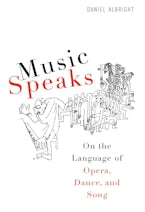
Title Details
566 Pages
22.8 x 15.2 cm
2 b/w, 609 line illus.
Series: Eastman Studies in Music
Series Vol. Number:
46
Imprint: University of Rochester Press
Pentatonicism from the Eighteenth Century to Debussy
- Description
- Contents
- Reviews
A generously illustrated examination of pentatonic ("black-key scale") techniques in the context of eighteenth- and nineteenth-century Western art-music.
Pentatonicism from the Eighteenth Century to Debussy offers the first comprehensive account of a widely recognized aspect of music history: the increasing use of pentatonic ("black-key scale") techniques in nineteenth-century Western art-music.
Pentatonicism in nineteenth-century music encompasses hundreds of instances, many of which predate by decades the more famous examples of Debussy and Dvorák. This book weaves together historical commentary with music theory and analysis in order to explain the sources and significance of an important, but hitherto only casually understood, phenomenon.
The book introduces several distinct categories of pentatonicpractice -- pastoral, primitive, exotic, religious, and coloristic -- and examines pentatonicism in relationship to changes in the melodic and harmonic sensibility of the time.
The text concludes with an additional appendix of over 400 examples, an unprecedented resource demonstrating the individual artistry with which virtually every major nineteenth-century composer (from Schubert, Chopin, and Berlioz to Liszt, Wagner, and Mahler) handled theseemingly "simple" materials of pentatonicism.
Jeremy Day-O'Connell is assistant professor of music at Knox College.
Pentatonicism from the Eighteenth Century to Debussy offers the first comprehensive account of a widely recognized aspect of music history: the increasing use of pentatonic ("black-key scale") techniques in nineteenth-century Western art-music.
Pentatonicism in nineteenth-century music encompasses hundreds of instances, many of which predate by decades the more famous examples of Debussy and Dvorák. This book weaves together historical commentary with music theory and analysis in order to explain the sources and significance of an important, but hitherto only casually understood, phenomenon.
The book introduces several distinct categories of pentatonicpractice -- pastoral, primitive, exotic, religious, and coloristic -- and examines pentatonicism in relationship to changes in the melodic and harmonic sensibility of the time.
The text concludes with an additional appendix of over 400 examples, an unprecedented resource demonstrating the individual artistry with which virtually every major nineteenth-century composer (from Schubert, Chopin, and Berlioz to Liszt, Wagner, and Mahler) handled theseemingly "simple" materials of pentatonicism.
Jeremy Day-O'Connell is assistant professor of music at Knox College.
The Rise of 6 in the Nineteenth Century
The Pastoral-Exotic Pentatonic
The Religious Pentatonic
The Pentatonic Glissando
Debussy and the Pentatonic Tradition
The Pastoral-Exotic Pentatonic
The Religious Pentatonic
The Pentatonic Glissando
Debussy and the Pentatonic Tradition
"Whether interested in theoretical developments, compositional practice, or historical influence, the reader will find this book to be a stimulating addition to our understanding of eighteenth- and nineteenth-century musical practice. . . . A robust and much-needed account of an underresearched aspect of music history and theory. . . . Remarkable scope. . . . Day-O'Connell's ability to bridge theoretical details and larger topics of musical signification . . . makes _Pentatonicism from the Eighteenth Century to Debussy_ an illuminating read." Rachel Chacko, JOURNAL OF MUSICOLOGICAL RESEARCH
"An ambitious study that comprises both a full-scale analytical study and a wide-ranging historical/hermeneutical treatise. Day-O'Connell's thorough research provides a clear and detailed history of the pentatonic and how it was received by the major theorists of the 18th and 19th centuries. . . . The first comprehensive study of this subject. . . . Valuable and fascinating historical information. . . . Of particular note are the author's analyses of works by Liszt . . . will likely inspire further research in this area. --" Mark McFarland, MUSIC THEORY ONLINE
"Like the pentatonic idiom itself, this book is readily accessible yet surprisingly rich in evocative associations. Music theorists and historians alike will find much of value in this sophisticated exploration of a largely neglected topic. -- : A Theory of Formal Functions for the Instrumental Music of Haydn, Mozart, and Beethoven" William Caplin, author of Classical Form: A Theory of Formal Functions for the Instrumental Music of Haydn, Mozart, and Beethoven
"Jeremy Day-O'Connell has produced a richly textured study of the influence of pentatonicism in the central repertoires of European music. The topic bears on many crucial issues, from sacred music to the exotic, and it is handled with proper concern both for musical technique and for signification. This is a book that needed to be written. -- (The Master Musicians) and The Music of Berlioz" Julian Rushton, author of Mozart (The Master Musicians) and The Music of Berlioz
"From the late Middle Ages onward, mainstream theorists have regarded resolution by semitone as the hallmark of directed motion in music. In this fascinating and deeply researched book, Jeremy Day-O'Connell welcomes us to the anhemitonic counterculture. The catalogue of musical examples alone (an anthology in all but name) is worth the price of admission. --" William Rothstein (City University of New York), author of Phrase Rhythm in Tonal Music
"Analytical studies of pentatonicism in the western tradition are surprisingly few, given its prevalence in nonwestern musics and western vernacular musics, and, as the author has demonstrated, its significance to art music from the nineteenth century and later. In his survey of an extraordinary breadth of repertoire, Day-O'Connell has made a significant beginning toward remedying that lack...Analyses are insightful and illuminating. The text is well-written and eminently readable. Day-O'Connell is to be commended for undertaking such an ambitious project and realizing it." Nicole Biamonte, THEORY & PRACTICE
Hardcover
9781580462488
August 2007
£120.00 / $145.00
Ebook (EPDF)
9781580466905
August 2007
£24.99 / $29.95
Title Details
566 Pages
2.28 x 1.52 cm
2 b/w, 609 line illus.
Series: Eastman Studies in Music
Series Vol. Number:
46
Imprint: University of Rochester Press













